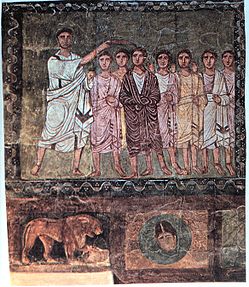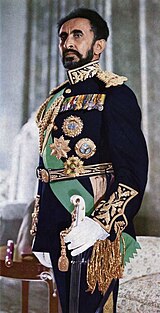Messiah
In the Abrahamic religions, the Messiah (from the Biblical Latin Messĭas, and this in turn from the Hebrew מָשִׁיחַ Māšîaḥ, pronounced [maː.ʃi.aħ] approximate pronunciation "Mashiach", meaning "anointed") is the savior or liberator of a group of people or humanity in general. In Judaism and Christianity, the king descended from David, promised by the prophets to the Hebrew people, that man filled with the Holy Spirit of God. Throughout history there have been many people who were considered Messiahs, but generally, it is understood that this particular title is assigned to the envoy chosen by God, who will bring peace to humanity by establishing the Kingdom of God.
Ha-mashiach (המשיח, 'the Messiah') often referred to as melekh mashiach (מלך המשיח, 'King Messiah'), is to be a Jewish leader, physically descended from the paternal line David through King David and King Solomon. It is believed that he will accomplish things predetermined in a future arrival, including the unification of the tribes of Israel, the gathering of all the Jews to Eretz Israel, the rebuilding of the Temple in Jerusalem, the beginning of an Age Messianic universal global peace, and the announcement of the World to Come.
The Greek translation of Messiah is Khristós (Χριστός), anglicized as Christ. Christians commonly refer to Jesus of Nazareth as the "Christ" or the "Messiah," believing that the messianic prophecies were fulfilled in the mission, death and resurrection of Jesus and that he will return to fulfill the rest of the messianic prophecies. Furthermore, unlike the Judaic concept of the Messiah, Jesus Christ is also considered by Christians to be the Son of God.
In Islam, Jesus (in Arabic, عيسى, romanized: Isa) is considered to have been a prophet and the Messiah sent to the Israelites, who will return to Earth at the end of time together with the Mahdi, and he will defeat al-Masih ad-Dajjal, the false Messiah. In Ahmadiyya theology, these prophecies about the Mahdi and the second coming of Jesus are believed to have been fulfilled in Mirza Ghulam Ahmad (1835-1908), the founder of the Ahmadiyya, in which the terms Messiah and Mahdi are synonymous with the same person.
Etymology
The term «Messiah» comes from the Hebrew מָשִׁיחַ (mashiach, 'anointed'), from the verbal root למשוח (mašáḥ 'anoint') and referred to an expected king, from the lineage of David, who would free the Jews from foreign bondage and restore Israel's golden age. He was called that since it was customary to anoint kings with oils when they were proclaimed. The equivalent term in Greek is χριστός (khristós 'anointed'), derived from χρίσμα (khrísma 'anointing'). The Greek term, widely used in the Septuagint and the New Testament, gave the English form "Christ".
Differences between doctrines
Of the Abrahamic religions in the world, we can highlight three main branches and the relationship they have with the belief in a Messiah.
Judaism
Within Judaism, the belief in the Messiah was based on the revelation of God, made through the Torah or Law of God. Since Genesis, many messianic prophecies were recorded within the law, which would allow us to recognize him when he arrived. Later, it gained momentum during the Babylonian captivity, when the conception of the messiah as savior acquired greater importance. However, the doctrine of the Messiah has not been an important topic of study because it is not the central axis of Judaism.
Maimonides, a Jewish theologian from the Middle Ages and his writings are the basis for understanding the concept of Messiah for the Jews, being one of the characters who has dealt the most with this subject. He affirmed: "I believe with absolute faith in the arrival of the Messiah, and even if it takes time, I will still wait for it any day."
Jewish eschatology indicates that the coming of the Messiah will be accompanied by a series of specific events that have not yet occurred, including the return of all Jews to the Promised Land, the rebuilding of the Temple, the era of peace and understanding in which "the knowledge of God" will fill the earth.
In Judaism, the messiah is considered a great charismatic leader who is well oriented with the laws that are followed in Judaism. He will be the one who will not "judge by what his eyes see" nor will he "decide by what his ears hear."
Although originally a fringe, somewhat controversial idea, the belief in the eventual coming of a future messiah is a fundamental part of Judaism and is one of Maimonides' 13 tenets of faith. Maimonides describes the identity of the Messiah in the following terms:
And if a king rises from the house of David, studying the Torah and occupied with the commandments as his father David, according to the Torah written and oral, and he will drive all Israel to follow and strengthen the violations in his observance, and will fight the wars of God, he must be treated as if he were the anointed. If he succeeded and built the Sacred Temple in its proper place and brought together the dispersed of Israel, it is certainly the anointed, and will restore the whole world to worship the Lord together, as it is said: "For then I will give the nations a clean tongue, that all may proclaim the Name of the Lord and worship Him with a united resolution (Soph. 3:9). "
Although the eventual coming of the messiah is a strongly held belief in Judaism, trying to predict the actual time when the messiah will come is frowned upon. These types of actions are believed to weaken people's faith in religion. So in Judaism, there is no specific time when the Messiah comes. Rather, it is the acts of the people that determine when the Messiah comes. It is said that the messiah would come when the world needs it most (when the world is so sinful and desperately needs the messiah to save it) or when it deserves it most (when genuine goodness prevails in the world).
Judaism about Jesus
Jews have traditionally viewed Jesus of Nazareth as one of many false messiahs that have appeared throughout history. He is seen as the one who has influenced his people the most and, therefore, the one who has caused the most damage.
Judaism has never accepted any of the prophecies that Christians attribute to Jesus, and for them, none of the prerogatives that will announce the coming of the messiah have occurred during his lifetime, so he cannot even be considered as a candidate for Messiah.
Christianity
The Bible seems to refer to several facets of the Messiah, one as king, ruler, and restorer, and another as a suffering servant. This has given rise to different positions about what the messiah should be like.
Christians call Jesus of Nazareth Messiah, calling him Christ, a literal translation of the Hebrew Messiah. According to the Torah, the promise of the coming of the Messiah extends to all the descendants of Abraham, Isaac and Jacob (later Israel), from whom the 12 tribes of Israel arose. According to Christian tradition, the promise made to Israel should actually be understood as made to all men, which is why Jesus would then be the Messiah and the redeemer of humanity.
Deriving from the concept in Judaism, the Messiah in Christianity is called the Christ - from the Greek khristós (χριστός), translating the Hebrew word of the same meaning. 'Christ' became the accepted Christian designation and title for Jesus of Nazareth, as Christians believe that the messianic prophecies of the Old Testament - that he descends from the Davidic line, and was declared King of the Jews - were fulfilled in his mission, death and resurrection, while the rest of the prophecies - which will usher in a Messianic Age and the World to Come - will be fulfilled at his Second Coming. Some Christian denominations, such as Catholicism, believe instead in amillennialist theology, but the Catholic Church has not adopted this term.
Most historical and mainstream Christian theologies view Jesus as the Son of God and God the Son, a fundamentally different concept of messiah from Jewish and Islamic concepts. In each of the four New Testament Gospels, the only literal anointing of Jesus is performed by a woman. In the Gospel of Mark, in that of Matthew, and in that of John, this anointing occurs in Bethany, on the outskirts of Jerusalem. In the Gospel of Luke, the anointing scene takes place in an indeterminate location, but the context suggests that it is in Galilee, or even a different anointing.
Other Christian currents
For Jehovah's Witnesses, the conception of messiah is not the same as in the rest of Christian currents (although the advent or Second Coming of Jesus is also of great importance to them), since they do not believe in the doctrine of the Trinity, so the messiah, in this case, is not God himself, but the only Son of the God of the Jews Jehovah. However, with Jesus comes the messianic age, restoring the world from the sin committed by Adam and Eve.
Islamic
Islam points to I'sa (Jesus of Nazareth), Mahdi or the well-guided one, as those who will inaugurate an era of justice.
For the majority of Islam, the concept of the Mahdi has an eschatology according to which the Mahdi will be born in the Last Times, so it is not admitted that he was a specific person who had already existed. It has also been indicated that the Mahdi will have a special relationship with the poor. In many areas the term Messiah is confused, ascribing it to the Mahdi, who will guide the Umma, made a return to belief, the Messiah being Isa (Jesus) the Son of Mary, who will return to fight alongside the Mahdi against Al-Dajjal (antichrist)
Today, there are important Muslim Shaykhs who claim that we are at the time of the coming of the Mahdi.[citation needed] There are even some who claim to have had contact with the Mahdi.[citation required]
Rastafarian Movement
Emperor Haile Selassie I of Ethiopia, who according to tradition is a direct descendant of Solomon son of David, is considered by the Rastafarian Movement as the third reincarnation –after Melchizedek and Jesus– of Jah, the Messiah.
Much of this belief is due to the "prophecy" of Marcus Garvey, who they consider to be a reincarnation of John the Baptist:
Look into Africa because when a Black King is crowned the day of liberation will be near.Marcus Garvey
Selassie, a devout Christian, denied being the Messiah, yet Rastas believe he is a messenger from God.
In popular culture
- The Messiah2007 Iranian film on the life of Jesus from an Islamic perspective.
- The Young Messiah, 2016 American film on Jesus' childhood from a Christian perspective.
- The Month of DuneFrank Herbert's novel of 1969, part of Dune's trilogy.
The following works include the concept of a messiah as the leader of a cause or liberator of a people:
- The Jewish MessiahA 2008 novel by Arnon Grunberg.
- The Messiaha novel by Andrei Codrescu of 1999.
Contenido relacionado
Fadrique de Toledo Osorio (1580-1634)
John the Baptist
The night of the generals


